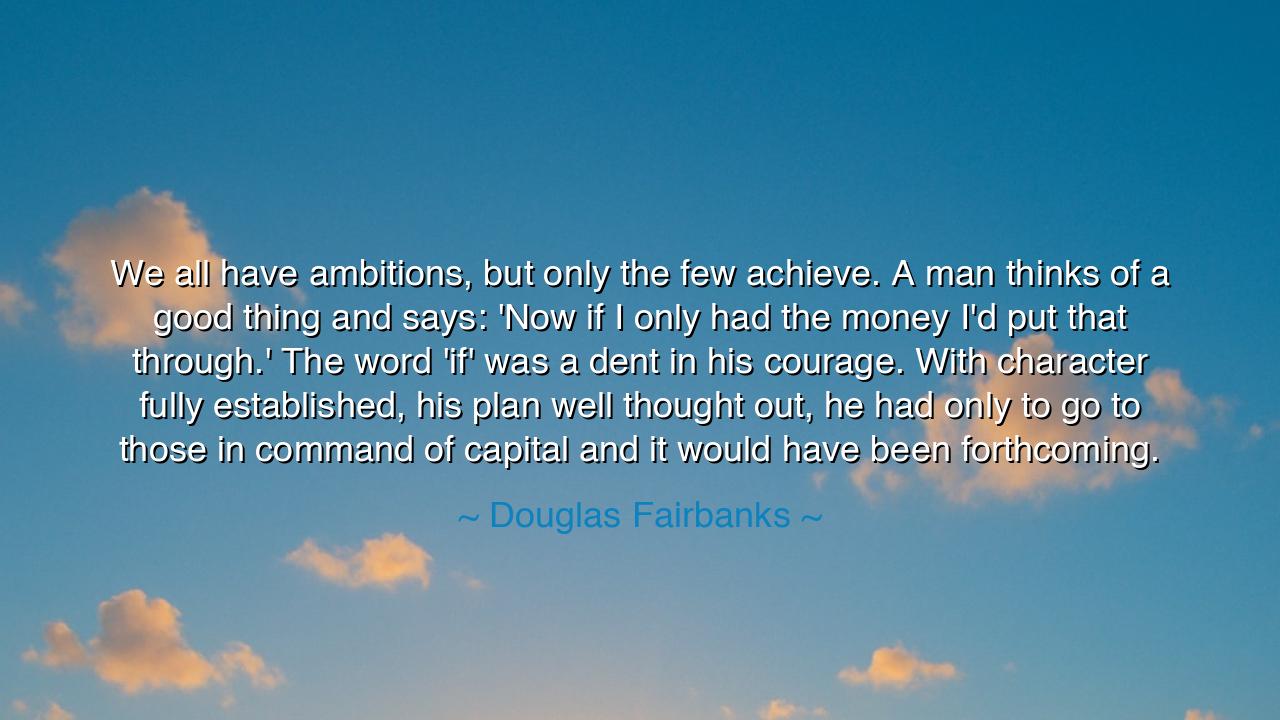
We all have ambitions, but only the few achieve. A man thinks of
We all have ambitions, but only the few achieve. A man thinks of a good thing and says: 'Now if I only had the money I'd put that through.' The word 'if' was a dent in his courage. With character fully established, his plan well thought out, he had only to go to those in command of capital and it would have been forthcoming.






“We all have ambitions, but only the few achieve. A man thinks of a good thing and says: ‘Now if I only had the money I’d put that through.’ The word ‘if’ was a dent in his courage. With character fully established, his plan well thought out, he had only to go to those in command of capital and it would have been forthcoming.” – Douglas Fairbanks
In these words of rare insight, Douglas Fairbanks, the golden-hearted titan of early Hollywood, speaks not merely of ambition, but of the spirit that separates dreamers from doers. He reminds us that all men harbor ambitions, but few possess the courage to act upon them. Many conceive noble visions in the mind but falter at the first obstacle — whispering that deadly little word, “if.” “If I had more money,” “if I had more time,” “if I had better luck.” Fairbanks exposes this word as a fracture in the armor of character, a wound through which fear and doubt enter. His teaching is clear: success belongs not to the man of ideas, but to the man of resolve — to the one who acts with conviction, who trusts in his own integrity and persistence to open doors that seem closed.
The origin of this thought is deeply woven into Fairbanks’s own life. Before he became one of cinema’s first great stars — the laughing hero who leapt across screens and hearts — he was a young man of little means but boundless faith. In an age when motion pictures were a novelty, he envisioned a new art form, one that could inspire millions. He had no assurance of fame, no wealth to secure his future. Yet, instead of saying “if,” he said “I will.” He acted. He built. He dared. And in doing so, he proved that courage attracts opportunity as a magnet draws iron. His success was not born from chance or privilege, but from character — that invisible wealth of determination, integrity, and purpose that makes others believe in your cause.
Fairbanks’s wisdom calls to mind the words of Leonardo da Vinci, another man who lived centuries before him but shared the same truth: “He who is fixed to a star does not change his course.” The great minds of every age have understood that ambition without action is illusion, and that excuses are the silent killers of destiny. The man who waits for perfect conditions will die waiting. The one who moves forward, though the path be uncertain, discovers that providence aids the bold. Fairbanks’s warning against “if” is, in truth, a plea for faith — faith in one’s own power to act, to persuade, and to create where there was nothing before.
The “word ‘if’”, as Fairbanks calls it, represents a weakness not of circumstance, but of will. It is the voice of hesitation that corrodes courage. How many have said, “If I had the support, I would build”? Yet the world does not grant its treasures to the hesitant. Even kings and captains of capital are drawn not to need, but to confidence — for confidence is the mark of character, and character commands trust. Fairbanks’s truth is profound: had the man first built himself — his principles, his discipline, his clarity of purpose — the money would have come. Character is capital. Those who have it never lack means, for others will lend their strength to a spirit that radiates conviction.
History offers many examples of this law in motion. Consider Thomas Edison, who failed a thousand times before his inventions succeeded. He had no wealth, no privilege, and often no support, yet he never spoke the language of “if.” His courage was his coin, and the faith in his vision his fortune. Because his character was unshakable, men of capital and influence followed him. Like Fairbanks’s teaching foretells, his resolve drew resources to him, as rivers flow to the sea. Those who act with courage are never poor; those who wait in fear are never rich.
This lesson speaks also to our own time — to every man and woman who hesitates before pursuing their dream. Many believe they lack resources, when in truth they lack belief. The money, the support, the opportunity — these are not causes of success, but effects. They follow courage and consistency as shadows follow the body. The true task, therefore, is not to wish for easier paths, but to strengthen one’s spirit. Build your character, sharpen your mind, clarify your purpose — and the world will answer.
So, my children, remember this: the word “if” is the gate that keeps you from your destiny. Each time you utter it, your courage wanes, your vision dims. Instead, speak with the voice of conviction. Replace “if” with “when.” Replace hesitation with preparation. Let your character become your foundation and your courage your currency. Do not wait for permission or perfection; begin with what you have, and the rest will follow.
For in the end, as Fairbanks teaches, ambition alone is a seed — but courage is the sun that makes it grow. And when a man’s character shines bright enough, even the powerful will turn their gaze toward him, and his dream will no longer be a whisper of “if,” but the living roar of “I did.”






AAdministratorAdministrator
Welcome, honored guests. Please leave a comment, we will respond soon